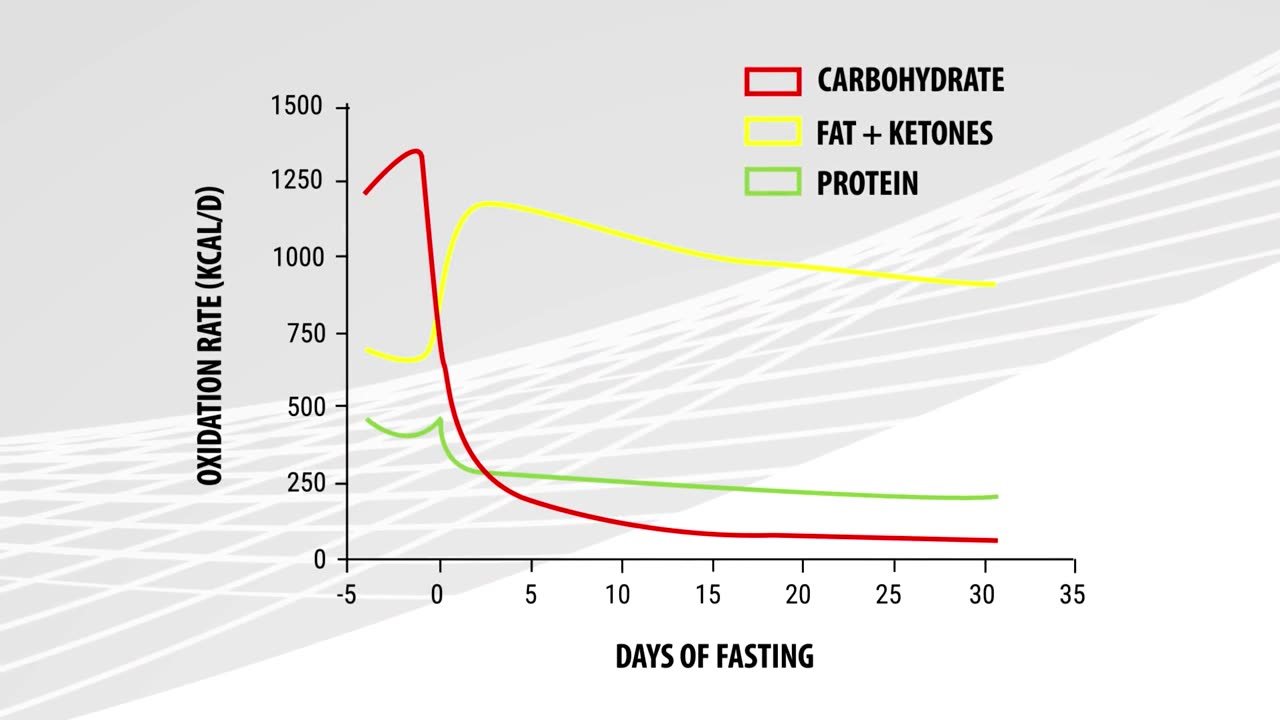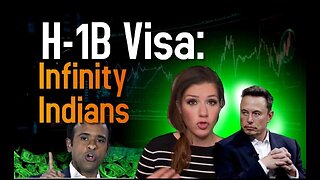Premium Only Content

What Happens When You Stop Eating!
What happens to your body if you stop eating for a day, a week, or months? Find out what will happen step by step. Do healing benefits come from fasting for an extended period of time? Discover what the scientific evidence has to say about intermittent fasting, water fasting, and extended duration fasting.
It's well known that when you eat your body begins a series of biological processes to digest and use the nutrients found in that food to help you repair muscle, create new cells, and even store some of the extra fuel as fat for later use. But it's not common knowledge that when you don't eat your body enters a completely different series of biological processes that are just as necessary and beneficial as the biological processes that occur after eating. Of course, if you don't eat for long enough the negative effects will start to outweigh the positive effects, but there are definitely myths and misconceptions about exactly what happens to your body when you stop eating, so today I want to go over that process step by step based on the scientific evidence.
And first, let's address the conventional advice which would tell you that it’s unhealthy to go for long periods of time without food. And I don't mean days or weeks, I'm talking about simply skipping meals. On the contrary, we've been told that we should eat small but frequent meals. The truth, however, is that there's nothing “natural” about eating five or six meals, spread out evenly over the hours that you're awake every day. This is because, throughout our evolution, we didn’t always have access to food, so you could claim that a “fasting and feasting” eating cycle is more natural than eating breakfast, lunch, and dinner every day.
Due to the fact that our ancestors had to cope with cycles of food shortage and food abundance, we've developed metabolic pathways that help us cope with prolonged periods without food. In fact, fasting for long periods can actually benefit your health rather than hurt it. But it definitely doesn't feel that way because one of the first things that’ll happen when you stop eating is you’ll start to feel an unpleasant feeling of hunger. Now the intensity of this feeling of hunger highly depends on how accustomed your body is to burning fat for fuel.
You see, most people regularly eat a high-carb diet. So, their body relies primarily on glucose for energy instead of using fatty acids or ketone bodies. Your body has the ability to store a lot of fatty acids in the form of body fat and those fatty acids can be used for energy at a later time when food is scarce by converting the fatty acids into ketone bodies in the liver. But with glucose, it's an entirely different story. Your body can only store a limited amount of glucose in your muscles and liver for future use, and this amount gets depleted after fasting for only about 24 hours but depending on how many carbs you eat regularly it can take as little as 8 hours or up to 48 hours. After that point, your body will have to rely on a different energy source in the form of fat and if your body isn’t effective at burning fat for fuel, this will likely lead to severe cravings especially for high carb foods.
Now, if you’ve trained your body to use fat for fuel by let's say following a low-carb diet, a keto diet or you've gone through long-duration fasting, then you won’t experience the same severity of hunger cravings. In fact, many people that fast frequently don’t experience hunger at all. This isn't only because their body is used to burning fat for fuel, but it's also because hunger levels increase at the times of the day that you normally eat. This is due to the hunger hormone ghrelin, which has the effect of stimulating your appetite when it's released. So during the first 24 hours that someone stops eating studies show that ghrelin will spike automatically for most people around the times of the day that they typically have breakfast, lunch, and dinner (1) and that spike will make you feel hungry. (1)
However, if you're someone that's already become accustomed to fasting every day, you won't experience these sharp spikes in ghrelin during your 16-hour fasting window, meaning you won't feel as hungry as someone that's used to more meals per day. (1) But even if you're used to breakfast, lunch, and dinner the data shows us that the spike in ghrelin is short-lived. if you just ride out the hungry feeling that you get, within about two hours from the initial spike in ghrelin, it should drop back down to normal levels and your appetite will drop down as well.
Regardless after about the first 24 hours your body will burn through your remaining glycogen stores and switch almost entirely over to burning fat for fuel which will slowly lead to weight loss. Since your brain primarily relies on glucose to function your body will be able to separate...
-
 2:24:10
2:24:10
Price of Reason
12 hours agoCan Hollywood Recover After Years of WOKE Activism? Will 2025 See B.O. Reversal? Wukong vs Microsoft
20.6K6 -
 LIVE
LIVE
Jerry After Dark
15 hours agoHole In One Challenge | Presented by TGL
4,535 watching -
 3:56:39
3:56:39
Alex Zedra
7 hours agoLIVE! New Game | The Escape: Together
53.1K9 -
 5:01:11
5:01:11
FreshandFit
8 hours agoJoe Budden Arrested For Being A Perv! Tesla Cybertruck Explosion
87.2K18 -
 2:08:45
2:08:45
Kim Iversen
11 hours agoNew Year, New PSYOP?: The Fort Bragg Connection In The New Years Terror Attacks
72.6K154 -
 1:41:18
1:41:18
Glenn Greenwald
10 hours agoTerror Attacks Exploited To Push Unrelated Narratives; Facing Imminent Firing Squad, Liz Cheney Awarded Presidential Medal | SYSTEM UPDATE #381
103K182 -
 1:00:32
1:00:32
Man in America
12 hours ago🔴 LIVE: Terror Attacks or False Flags? IT DOESN'T ADD UP!!!
69.2K23 -
 1:02:38
1:02:38
Donald Trump Jr.
14 hours agoNew Year’s Terror, Latest Breaking News with Sebastian Gorka | TRIGGERED Ep.204
201K415 -
 59:59
59:59
The StoneZONE with Roger Stone
9 hours agoAfter Years of Targeting Trump, FBI and DOJ are Unprepared to Stop Terror Attacks | The StoneZONE
65.6K26 -
 1:26:42
1:26:42
Leonardaisfunny
7 hours ago $4.70 earnedH-1b Visas: Infinity Indians
43.1K18